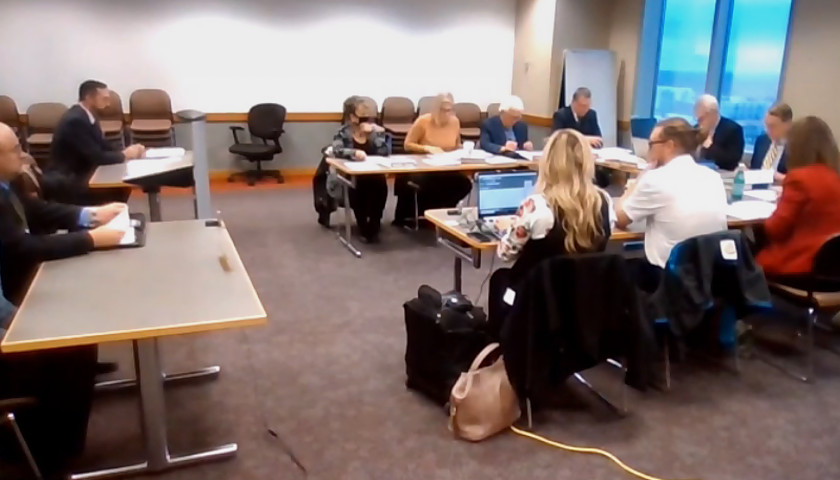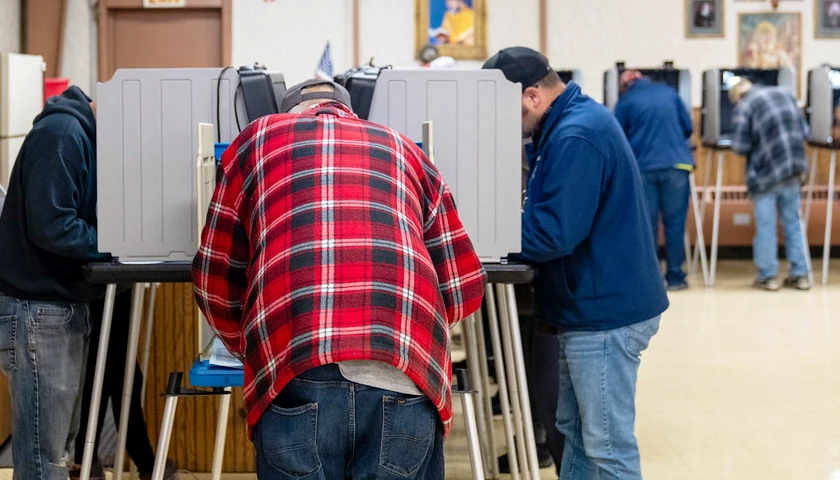The preliminary hearing to review allegations of wrongdoing by Ohio gubernatorial candidate Joe Blystone was referred to a full hearing by the Ohio Elections Commission (OEC) on Thursday.
The action stems from a complaint filed with the Commission that alleges Blystone underreported cash contributions, failed to disclose the names of those contributors in campaign finance reports, and that the purpose of doing so was to “facilitate a theft of these campaign funds by the respondents.”
The Ohio Star reported in early November that former co-campaign manager, Sarah Chambers, filed the complaint.
“Candidate for governor Joe Blystone’s campaign has engaged in an unprecedented level of illegal activity. More than a dozen Blystone for Governor donors, volunteers, and staff members who witnessed these illegal acts have come forward,” the complaint began:
The Blystone for Governor campaign collected tens of thousands of dollars in illegal donations, failed to document thousands of dollars in donations, violated numerous campaign finance laws and did so deliberately. As you will see, staff members were given specific instructions to NOT document donor information. Staff members have provided sworn affidavits, video documentation, bank statements, and various other pieces of evidence that show Joe Blystone’s campaign has violated multiple laws.
Watch the hearing:
TRANSCRIPT
Richter: The next case on the agenda this morning is case 2021G022 Chambers versus Blystone. We use the chair members of the commission and police and allegedly the respondent probably responded failed his property this way.

All campaign contributions and financial reports uh his response was submitted which was circulated by one of you to the allegations uh as well, although the human requests from the council initially as I indicated to you the commission received a request for a continuance from the preliminary council completed, but that was subsequently removed.
My recommendation is to step in that upper hearing. Mr. Collins, council for the proclaimed is here. Mr. Brown, counsel for the respondent is here. The commission would like to hear from them all. Let’s figure that out.
Collins: Yes. Thank you, good morning. My name is Scott Collins Ohio supreme court number 0076809. I’m an attorney representing Sarah Chambers the complainant in this matter. As a preliminary matter, I would argue that the respondents have not filed a proper response under oath.
Ohio Elections Commission rules require that respondents have been informed twice by letter that they must file a response under oath. An unsworn motion dismissed filed by an attorney without affidavits from all the respondents in my opinion is not a proper response and should be disregarded by the commission.
If the commission does choose to consider this motion I would urge you to find it holy without merit. It’s really clear this commission has had clear jurisdiction over candidates, campaign committees, treasurers, and other individuals and entities my recollection since at least 1996 in its present form.
More importantly from our perspective is nowhere in this response is an actual denial of the allegations in the sworn complaint. There is a separate affidavit from the candidate’s wife and treasurer that’s full of easily provable factual errors but again no actual denials of the allegations.
Let me speak briefly to the complaint if it’s at the pleasure of the commission. Sarah Chambers was a former campaign manager for the Friends of Blystone campaign. Other persons that provided sworn statements were also key leaders in this campaign.
There were some unsworn statements that were part of the complaint, but it’s our plan to put those individuals under oath if and when a full hearing is held and if their testimony is needed.
We have also recently secured the cooperation of Joanna Swallen, Joe Blystone’s former lieutenant governor running mate who will also provide sworn testimony at a full hearing. Mrs. Swallen withdrew her candidacy and leftover these very same issues.
To sum this up, the complaint, Mr. and Mrs. Blystone and his campaign committee have taken in vast amounts of cash for the campaign in violation in our opinion of many campaign finance provisions.
Ohio law requires them to itemize cash contributions that are in the amount of $25 to $100 and file them with their reports. Ohio law prohibits them from accepting contributions and cash of more than $100 per person. Contributions of under $25. may be reported as a lump sum, however, the campaign must still keep records of these contributions.
The Blystone’s allege and reported that they raised approximately $88,000 in cash contributions of under $25. that was over one-third of their contributions raised that we believe they simply cannot and will not document these contributions in any way.
What they have appeared to have done to us at events after event is to pass buckets around and have people simply throw cash in the buckets there’s no documentation no donor cards, no limit on how much cash they’ve taken from an individual just throw it in the bucket and guess what?
They were reported all as contributions of 25 and under Mrs. Chambers. And the witnesses strongly believe the Blystone campaign has no records whatsoever for these $88,000. in cash contributions that they received, they as being under $25.
They also strongly believe this act was deliberate and have testified there are sworn affidavits that it was. Sworn witness after sworn witness have alleged they personally witnessed or they themselves made contributions of over $25 which were never reported.
Sarah Chambers alleges that she made contributions not by cash but through a credit card via their website in excess of $13,000. and has provided the receipts and the bank records to prove it along with her sworn testimony. But yet the campaign has not reported these transactions during that time period they took place.
Complaint’s exhibit one is a video of Dr. Doug Frank making a $100. cash contribution at a public event that was never reported. Since the complaint was filed we have attained another video, and we will show it if possible at a full hearing of Dr. Doug Frank, making a second $100 cash contributional video that was also never reported.
Response argued these contributions were props. Commissioners, with all due respect, that assertion in itself is deception and in my opinion a clear violation of campaign finance laws. They are also wholly factually incorrect in their affidavit.
Dr. Doug Frank did not hand Joe Blystone a $100 bill. He counted out five $20 bills. And it’s all on video. This campaign in our opinion can’t tell the truth even when they’re caught red-handed on tape. We certainly look forward to putting Mr. Frank under oath at a further period.
Members of the commission, we have videos, we have bank statements, and we have multiple sworn witness statements from former campaign officials that illustrate numerous violations of Ohio’s campaign finance laws.
We believe that we have provided more than enough in this sworn complaint to show that probable cause exists from multiple violations of Ohio’s campaign finance laws at a full hearing we believe being able to prove these violations of Ohio’s campaign finance laws. We would urge the commission to set a full hearing and I’d be happy to take any questions that you may have.
(Hearing continues…)
Brown: Here are the things we would like to have had that would make it sufficient to have been played with. Particularly we would like to replace the amount. What did you actually see what did you not see that is known per se that is by principle and fairness acquired in the compliant.
All right and then we get to Miss Chamber’s donation which was referred to in the complainant’s remarks. Miss Chambers admits that she was refunded money from the campaign. She provides no context for the money that she allegedly gave to the campaign and then she says this is what was reported.
In order to plead with particularity, she needs to explain why that amount that was reported wasn’t correct and her complaint doesn’t do that. So it doesn’t give us enough information to respond because we don’t even know how much she alleges she was refunded.
And we don’t know what the context was of the money that she gave was. Was it in kind where she was, for example, buying some hot wings for a fundraiser or something like that? And that would make a big difference in terms of the reporting. The treasurer has said I’ve reported everything.
I’ve deposited everything I took. I deposited it and I reported it accurately. That’s her requirement. That’s what she testifies she did. The complainant referred to a $100. cash donation with Dr. Frank. Again, the statute makes would make Dr. Frank the liable party, not the campaign because it says the person who makes that donation in the statute.
However, there is testimony in the affidavit that the $100. was meant to encourage people at the event to give money and the money was given back to him. That it was a presentation. There is nothing in Ohio law that requires somebody to report money that you didn’t take. The treasurer has reported what was given to her.
If that money was never given to her, it doesn’t have to be reported. If it was given to a person in the campaign and they gave it back, they burned it whatever they did with it, the treasurer’s not responsible for that.
The treasurer is only responsible to take it, pause it, and report it. The treasurer is not responsible for what happens out in the field. So even if this was a violation, the campaign is not liable, the treasurer is not liable, maybe Dr. Frank is. I don’t know.
Plus, there’s a testimony in the affidavit that nothing wrong was done anyway. Another one is there’s a video reference in the complaint. We’ve never seen it and we have no idea what they’re talking about. That’s classic providing enough particularity.
There’s no description of what happens in the video other than allegedly Joe Blystone takes money. Again even if it’s true, failure to state a claim because the treasurer is not liable for any of those transactions. Now let’s say we ignore all these layers of things that I put in front of you.
Let’s say the candidate is liable and there is a statute that says that the candidate should not knowingly take donation that violates campaign finance law. The penalty for that is you take the amount that was improper and you double it and that’s your fine.
The first problem is there’s no way to calculate these are generalized accusations. There’s no way to calculate what the improper donation was. Even it was, we’re talking about a minor problem if proven the affidavit for the treasurer says that if there is a mistake I will correct it.
So it’s an easily correctable mistake if it is a mistake at all. And furthermore, it’s a small fine basically. So as soon as we have that there’s a mistake then we’ll address it. My complaint, I tried the best I could to make this as easy as possible to read.
You’ll see I indexed the motions to dismiss and I also indexed the allegations. So I’m glad to take questions on that. I just want to take a second to make sure I didn’t miss anything in my remarks. Last thing.
There is even a so you can see, you don’t have to dismiss the entire complaint you can dismiss counts as well. I asked for several counts to be dismissed for one violation or another. One of the biggest ones is we have a witness in this complaint who isn’t even named.
And that’s a violation of due process because the respondent has a right to confront witnesses even in civil complaints. I referenced the law on that in the filing. But it’s also a violation of the rule against hearsay.
This classic hearsay is an out-of-court statement by someone and we don’t even know who it is. So the complaint like I said throughout, has numerous things that fail to comply with the statute. One of them is, there are a number of affidavits that are missing, so that can’t be accepted so those have to be thrown out.
One big one is the complaint itself. And I wasn’t sure at first what I was looking at. I’ve never seen a complaint structured like this before. And being a civil litigator, I look at a lot of complaints and even pro se complaints and I just didn’t know exactly what I was looking at.
If you look at the bottom of the complaint you’ll see that there is a signature and a notary. That’s page 10 that you have in front of you. And at the top, they reference, I’m doing this on personal matters.
Now of course any affidavit has to be done on personal knowledge and I objected and asked for the dismissal on the basis there was no affidavit because I saw the signature at the bottom in a notary with no affirmation to personal knowledge which is required by the statute as well.
At the top of the complaint, there’s a note I’m saying this on personal knowledge. Well even if that’s all true which it is there it says personal knowledge at the top and says personal knowledge at the bottom, that witness cannot testify to the things inside that complaint.
You can’t testify to what other people saw and you can’t testify to what other people said. You can only testify to what you saw on personal knowledge. Therefore the entire complaint must be dismissed because it lacks proper affirmation. I’m glad to take any questions. Thank you.
Read the full complaint plus all the exhibits here.





